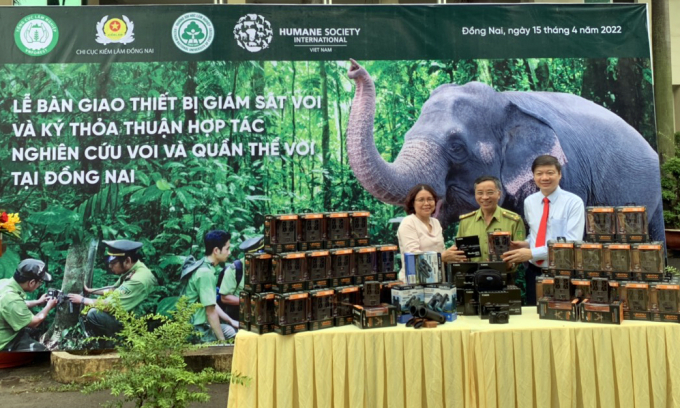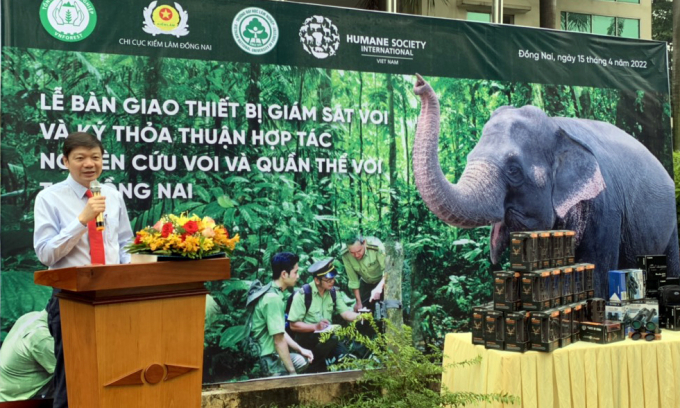May 18, 2025 | 04:15 GMT +7
May 18, 2025 | 04:15 GMT +7
Hotline: 0913.378.918
May 18, 2025 | 04:15 GMT +7
Hotline: 0913.378.918

Seventy devices including ten cameras and 60 camera traps was handed over to the Forest Protection Department in the southern province of Đồng Nai on April 15. Photo: Bao Thang.
Seventy devices including ten cameras and 60 camera traps was handed over to the Forest Protection Department in the southern province of Đồng Nai on April 15.
This is a part of the project "Protecting Asian elephants in Đồng Nai through solutions to reduce and prevent human-elephant conflict in a sustainable way" implemented by the province’s Department of Forest Protection, the Vietnam Administration of Forestry and Humane Society International (HSI).
On the same day, the agencies also signed an agreement to cooperate in research on the ecology and behaviour of elephants with a branch of the University of Forestry in Dong Nai to ensure the continuity and sustainability of the programme on elephant monitoring.
The elephant and habitat monitoring programme aims to understand elephants and their habitats - one of the fundamental solutions for elephant conservation and reducing human-elephant conflict.
Data on the characteristics and behaviour of elephants and human-elephant conflicts will be recorded and updated regularly. This will be analysed to find out the social structure of the herd, the level of human-elephant conflict, and impact projections to tailor possible solutions.
Tran Quang Bao, Deputy Director of the Vietnam Administration of Forestry, said that the elephant population in Việt Nam had declined dramatically over the past four decades.
However, after much effort, the elephant population in Đồng Nai showed positive signs.
Recently, the Government allowed to extend the implementation of the Master Plan on Conservation of Vietnamese Elephants to 2025, which created favourable conditions for the province to continue conservation.

Tran Quang Bao, Deputy Director of the Vietnam Administration of Forestry speaks at the device handing over ceremony. Photo: Bao Thang.
“The cooperation based on each side's strengths to monitor elephant herds to come up with management solutions has clearly demonstrated the commitment of all parties in efforts to conserve and sustainably develop elephant populations in Việt Nam,” he said.
Tham Hong Phuong, HSI's Country Director in Việt Nam, said that the human-elephant conflicts had occurred for many years, damaged crops and caused panic in the surrounding communities.
“The decline in elephant populations in Việt Nam in the last two decades and the disappearance of many species such as the java rhino and the tiger puts a lot of pressure on conservationists like us,” she said.
“We hope this surveillance study will help us get to the root of the problem and that the results will be a 'voice' that reflects the needs of animals - a stakeholder that we rarely consult when developing plans conserving them.
“We firmly believe that preserving and increasing the wild elephant herd naturally in Đồng Nai will be a great source of inspiration for conservationists across the country.”
According to the Vietnam Administration of Forestry, small, fragmented elephant populations in Vietnam have declined by as much as 95 percent over the 40-year period from 1975 to 2015. Some are at risk of extinction without conservation plans in place.
In Dak Lak alone, at least 23 wild elephants died in the period 2009-2016, accounting for about 25 per cent of the total current herd. In Dong Nai, about 9 wild elephants died before 2014.
Currently, Dong Nai is home to about 20 wild elephants. Dong Nai Forest Protection Department has built and completed 50km of electric fences and is building another 25km to reduce conflicts between elephants and people.
Le Viet Dung, Deputy Director of Dong Nai Forest Protection Department said: “The specialized equipment handed over will be a useful tool for building a database for each individual elephant. Individual identification helps us gain a deeper understanding of an individual's condition, characteristics, morphology, ideas about their movement and how elephants use their natural habitat, as well as how they react to humans.”
Since 2019, HSI has coordinated with the Vietnam Administration of Forestry and the Dong Nai Forest Protection Department to implement the project “Asian Elephant Protection” in Dong Nai through solutions to reduce and prevent conflicts between elephants and humans.
After three years of implementation, the project has achieved many encouraging results. Nguyen Sy Ha, Deputy Director of Forestry University, Dong Nai Branch, said that they were ready to cooperate and accompany stakeholders to implement the programme on monitoring elephants and their habitat to prevent the loss of biodiversity and the extinction of endangered and rare species.
Translated by Hien Anh

(VAN) 14 out of 35 domesticated elephants in Dak Lak province have had their living conditions improved, with 11 of them currently participating in the non-riding elephant tourism model.

(VAN) Muong Nhe Nature Reserve hopes that being upgraded to a national park will lay the foundation for forest protection efforts to be carried out in a systematic, modern, and sustainable manner.
/2025/05/16/3923-2-171845_52.jpg)
(VAN) Lower costs, higher yields, and improved soil quality are outstanding benefits that soybeans bring when integrated into the crop rotation system.

(VAN) The 'For a Green National Environment' programme aims to promote a green lifestyle, support businesses in implementing ESG practices, and turn Net Zero commitments into concrete actions.

(VAN) Cold-barn systems efficiently manage environmental and temperature conditions, which aids in the prevention of respiratory diseases in pigs and protects them from the vectors that transmit African swine fevers.

(VAN) To tackle challenges, the project 'Addressing key technical bottlenecks in the grouper supply chain in Vietnam' has been underway since 2024.

(VAN) The project 'Disease-Resilient and Sustainable Cassava Production Systems in the Mekong Region', funded by the Australian Center for International Agricultural Research (ACIAR), is being implemented from 2024 to 2028.